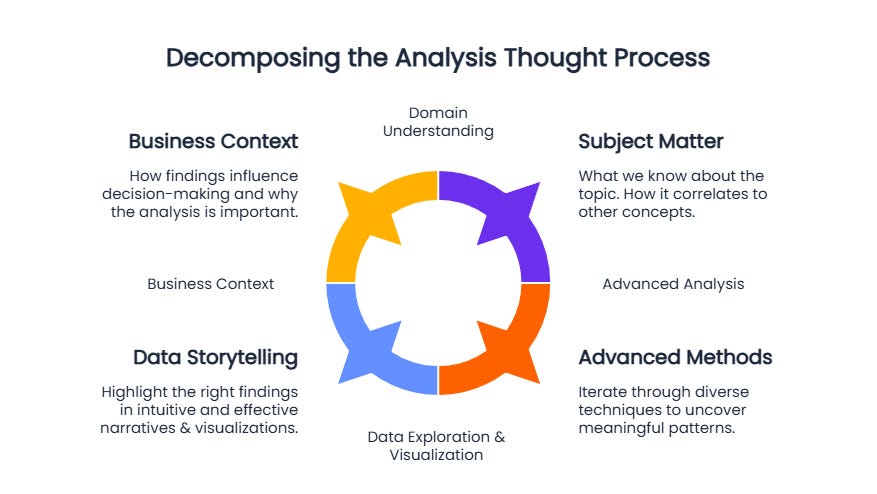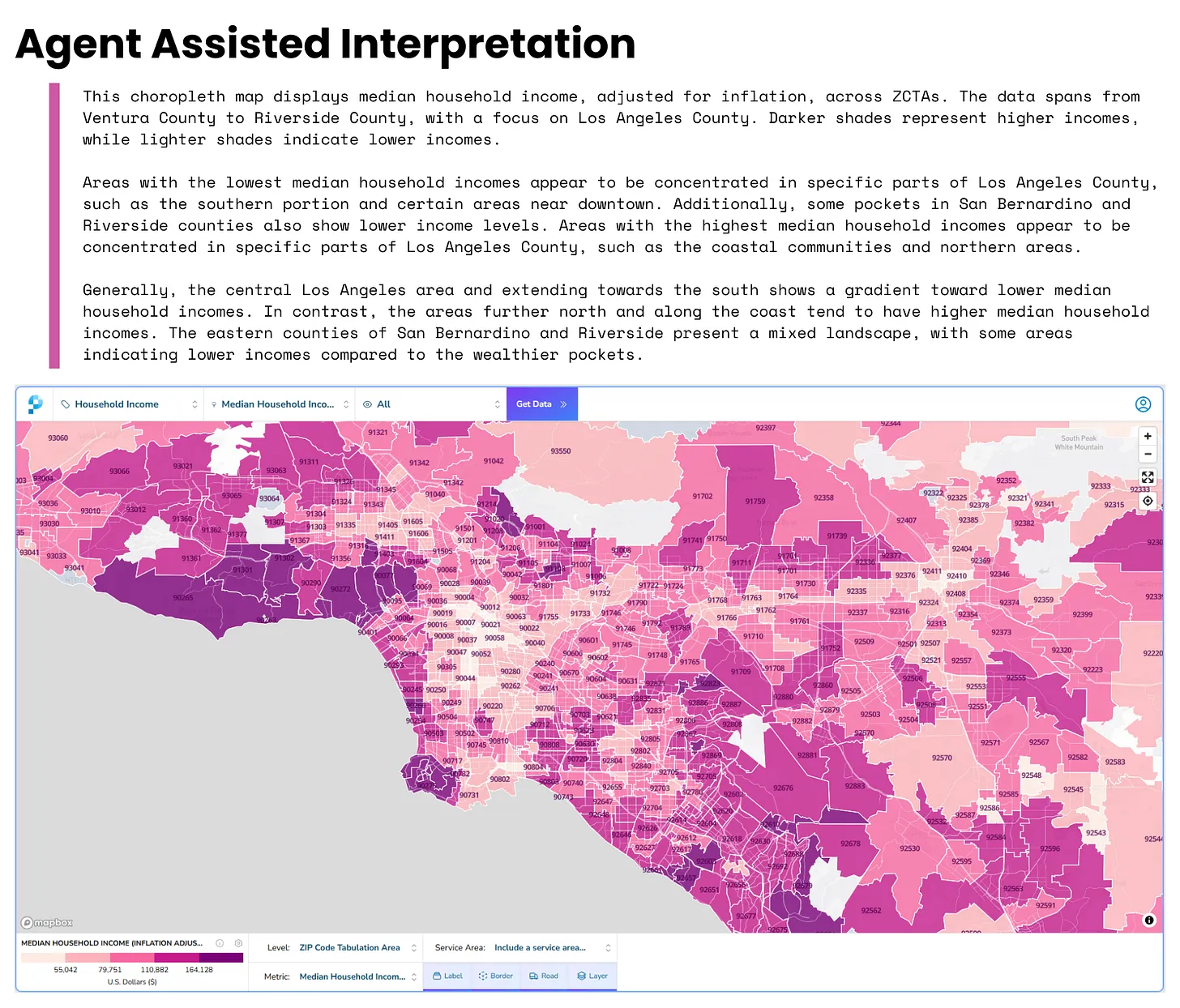TL;DR;
Generative AI is fundamentally reshaping how we engage with data:
- AI Analyst Agents and multi-agent systems will automate complex analyses and deliver meaningful answers - not just charts.
- The future of dashboards is dynamic, agent-driven content tailored to user focus, but standards remain essential.
- Data literacy in community health and CBOs is a major opportunity, with agent-assisted interpretation bridging long-standing gaps.
In my early days in healthcare analytics, data portals, open data and data visualization were the center of attention. Under the premise that more data would lead to more informed communities, we pointed our attention toward building tools that packaged data into digestible bites. Even governments sponsored code-a-thons to leverage the plethora of newly accessible open data for a more efficient government and more informed communities.
At the same time, we quickly realized that data, even in the sexiest of tools or platforms, was only as powerful as the impact the recipient was able to make with it. There’s complexity in that last statement - the ability to “do something” with data sits at a sensitive intersection of humans and technology.
From Standards to Storytelling
Technology has matured substantially. We have tools to democratize data, tools that help us visualize data, we even have tools to make us lake houses (although I’m still waiting for a tool for a tiny house). Joking aside, it HAS gotten easier, cheaper, and faster to ship data and insights, but at the cost of utility. We’ve packaged insights into pre-made, production-line boxes (I mean standards), because quantity. Reduce end-user cognitive load, ship faster, and “develop a shared aesthetic vocabulary” - sound familiar? If yes, you might enjoy this old gem:
Before you call me a blasphemer, I’m not here to suggest that we forego having a thoughtful design framework, or to ignore that we rarely have the freedom to perfect our analytics products in vivo. What I am suggesting is: we may not need to choose for much longer. The future of storytelling with data is not frameworks, but bespoke apps that adapt to how end-users consume and act on data.
Ask AI Grows Up
Just a few years ago, “asking AI” was rather clunky, and lacked ingredients to inspire trust (like consistency or fluidity). Fast forward, today’s tools a LOT more credible & useful (ala Databricks Genie or even Tableau Pulse). Most importantly, these tools are also a lot more visible to non-technical circles. However, this is no longer “frontier,” and real impact in analytics will come from agent analysts that can provide real, deep analysis and decision support over reports and visualizations.
If 2025 is the year of AI agents, I would not be surprised if 2026 or 2027 were the years of true analyst agents. We’re already seeing the beginnings of this with deep research capabilities across most major model providers. Organizations are unique in the way they collect, document, analyze, interpret, and ultimately make decisions with data. Useful solutions will need to effectively decompose the analysis & thought process, giving agents the tools and workflows to successfully navigate their way to meaningful answers that are more than a literature review.
Although a gross simplification, thinking about it in terms of business context, subject matter expertise, analytical methods, and data storytelling is a good paradigm we use to ideate through the roles, skills, and tools different agents might play in the analytical process.

Decentralized Data Visualization
While “ask an agent” will help us be more effective when we start with a question, agent-driven dashboards will help us get the bigger picture, faster. Presently, we build tools based on frameworks we choose to adopt, and train our end-users to those paradigms. We centralize and standardize. There’s value in that - economies of scale (when there are humans involved) and a single place of reference. At the risk of getting tomatoes hurled at me, I think there’s a new gold standard on the horizon: dynamic platforms that generate content around our specific focus. And this will completely change the flow of how we seek and ingest insights.

In this new paradigm, it matters less which dashboard you captured an insight from. What matters more is the accuracy of the underlying data, and how effectively your organization develops and manages metadata. The place of reference becomes irrelevant, and economies of scale? Well….when there’s no longer a human-driven production line involved…perhaps this is the analytics era of dark factories.
Unlocking Data Literacy
The key to real, meaningful use of data and insights resides not in what data we make available, or even in the how. Rather, it’s whether our users can interpret and act on what they see. This is an area that I believe has been largely ignored in this AI revolution so far, and one we’re deeply connected to and interested in advancing.
Agent Assisted Interpretation
AI Agents are becoming multimodal - processing text, images, video, and audio - making them excellent partners in data interpretation. They will use the breadth of internal and external information (from generic to highly specialized) to help us make sense of the information before us.
Nowhere will this be more impactful than in community-based and community health organizations. Using data in daily decision-making has historically been a fluid gamble - staff may or may not have any formal analytics training, yet are expected to use data in their daily decision-making. For them, the trusted AI Analyst will bridge this gap and give organizations the ability to direct their financial focus closer to the frontline.
Early Signs of Value
Indeed, we’re seeing some early signs of success & value in our own products. As part of our release of the Public Health Atlas (more on the Atlas later), we recognized the tremendous need and opportunity to integrate AI into our platform in ways that help users better understand the data and hone in on the right insights faster. While still early, our AI Analyst Agent has shown tremendous capability in reviewing and interpreting choropleth maps not just for the content, but also the context. The image below shows an early output. Notice the ability to both hone in on the findings, but also the geographic context (the areas generally represented on the map).

AI Analyst Agents are poised to transform analytics - not just by changing how we deliver data & insights, but by fundamentally changing how we engage with data. The best of products will enable personalized, dynamic, and intuitive interactions with insights, and AI agents will bridge long-standing gaps in data literacy. For organizations at the frontlines of public health, this won’t be just an efficiency gain, it will change the game.
Are you a community health or community-based organization leader? We would love to engage with you to understand your challenges and work together to make access to AI Analyst Agents equitable. Please reach out to us at hello@thinqpoint.com.